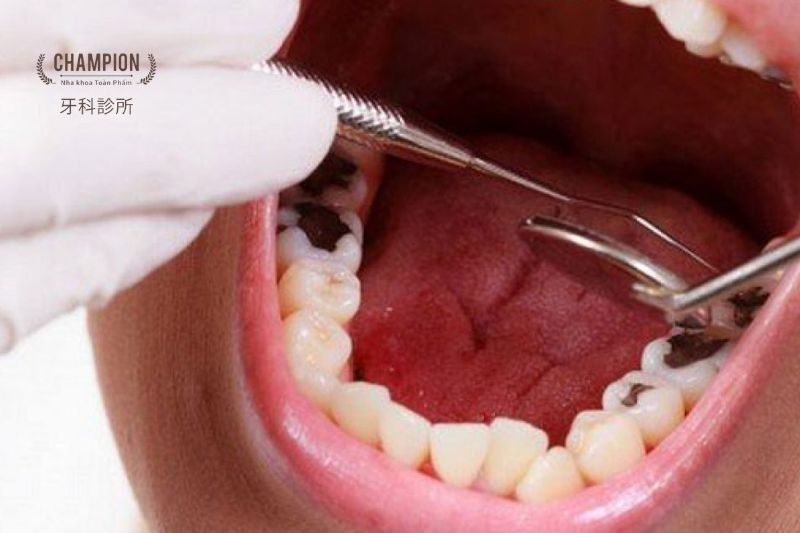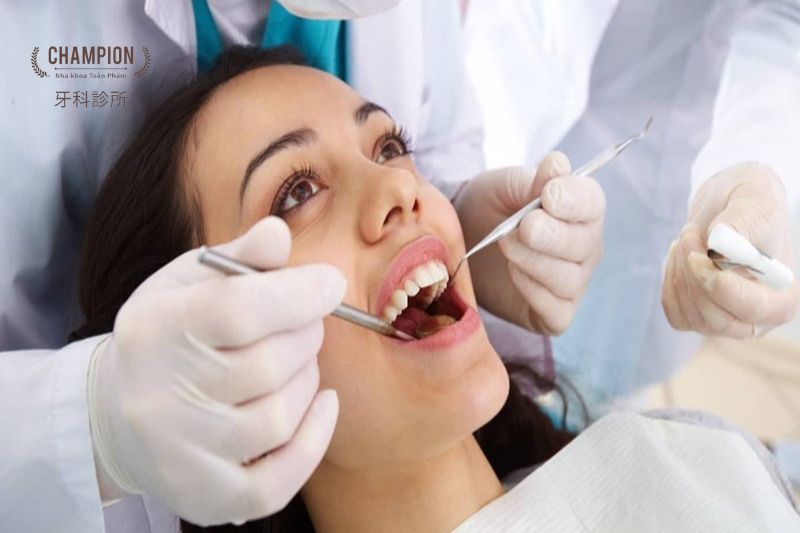Wisdom teeth with cavities are a common concern in dental health. Many people worry about whether cavities in wisdom teeth are dangerous and whether they should be filled or extracted. In this article, let's explore this issue in more detail with the expertise of Champion Dental Clinic.
Causes of Decay on Wisdom Teeth
Wisdom teeth, also known as the third molars, are the last set of teeth to emerge in the mouth. Typically, they erupt between the ages of 17 and 25. Due to their position as the furthest back teeth and their deep location, maintaining proper oral hygiene for these teeth can be challenging. Furthermore, because they erupt last, there is limited space available for the wisdom teeth, leading to issues such as horizontal or impacted growth, which can result in them becoming trapped within the gums or bone.
Wisdom teeth are also susceptible to cavities, especially when they grow in an irregular manner or become impacted within the gums. The causes of cavities in wisdom teeth may include:
- Food particles easily get stuck in the crevices of wisdom teeth, providing a conducive environment for bacterial attack and leading to various dental problems.
- The deep and complex positioning of wisdom teeth makes it difficult to clean, thereby preventing effective removal of plaque buildup and food debris.

How to identify cavities in wisdom teeth?
To identify cavities in wisdom teeth, you can look out for the following signs:
Pain and discomfort
One of the first signs of cavities in wisdom teeth is experiencing pain and discomfort in the area surrounding the affected tooth. The pain may occur while chewing, eating, or when exposed to hot, cold, or sweet food. If you feel pain or discomfort, it could be an initial indication of cavities in your wisdom teeth.
Bad breath
Cavities in wisdom teeth can also cause unpleasant breath odor. If your breath cannot be freshened despite maintaining regular oral hygiene, it could be due to cavities in your wisdom teeth.
Infection and swelling
Cavities in wisdom teeth can lead to infection and swelling in the surrounding area. If you notice swollen, red gums, and signs of infection such as pus discharge or foul odor from the mouth, it could be an indication of cavities in your wisdom teeth.

Are Decay on Wisdom Teeth dangerous?
Similar to many other teeth in the dental arch, cavities in wisdom teeth can cause significant complications.
- Infection: Infection can intensify the severity of pain and discomfort. This can greatly impact daily activities, as well as the overall health and well-being of the patient.
- Spread of cavities: If cavities in wisdom teeth are left untreated, bacteria can spread to neighboring teeth, leading to a cascade of cavity formation. This is one of the serious consequences that can adversely affect oral health.
Therefore, if you experience any signs of wisdom tooth pain, it is advisable to visit a dentist for an examination and prompt treatment to prevent unwanted complications.
>> See more: Wisdom Teeth Coming In and case that need to be extracted
Should Decay on Wisdom Teeth be extracted or filled?
To treat cavities in the wisdom teeth, there are two options: extraction or filling. The decision on the treatment method depends on several factors, such as:
- Depth of the cavity
- Direction of tooth eruption
- Potential impact on the surrounding area
Filling wisdom teeth
In cases where the wisdom teeth are erupting in a straight manner and have only minor cavities, filling the tooth is usually preferred. Filling the cavity helps seal and prevent food particles from getting trapped and bacteria from infiltrating. If the cavities have spread to the neighboring teeth, root canal treatment may be recommended.
Extracting wisdom teeth
Wisdom teeth are located in a relatively sensitive area and are associated with multiple nerve endings. Before proceeding with treatment, dentists will typically take X-rays to assess the direction of eruption and the severity of the cavities. In cases where the cavities are deep and affecting the tooth pulp, extraction may be necessary to protect the surrounding jaw area and adjacent teeth.
Additionally, certain cases such as horizontally impacted, misaligned, or submerged wisdom teeth may also require extraction. This approach ensures oral health is maintained and minimizes potential complications associated with misaligned wisdom teeth.
At Champion Dental Clinic, advanced machinery and equipment are available to reduce swelling, pain, and facilitate faster healing after wisdom tooth extraction. The process is performed smoothly and comfortably. Most patients who have had their wisdom teeth extracted at Champion Dental Clinic report positive feedback, experiencing minimal pain and swelling.

Post-operative care instructions after deep wisdom tooth extraction
After the extraction of a deeply impacted wisdom tooth, following these guidelines will help promote quick healing:
- Take prescribed medications as instructed by the dentist and adhere to follow-up appointments.
- Prioritize soft, easily swallowable foods such as porridge, soup, etc. Avoid hot foods that may irritate and cause bleeding in the newly extracted area.
- Avoid using toothpicks or any sharp objects that may touch the extraction site to minimize any disruption to the healing process.
- Brush your teeth gently with a soft-bristled toothbrush at least twice a day.
Cavities in wisdom teeth can be dangerous if not properly managed and treated. Maintaining a proper oral hygiene routine and regular dental check-ups are crucial in preventing and treating cavities in wisdom teeth. Contact Champion Dental Clinic if you or your loved ones are experiencing any issues related to wisdom teeth.
Vietnamese & English: (028) 5411-2295
中文: (028) 5411-2297 172 Nguyen Luong Bang, Tan Phu Ward, District 7, Ho Chi Minh City.
Fanpage: Champion Dental Clinic 牙科診所
Zalo: Champion Dental Clinic
Youtube: Champion Dental Clinic 牙科診所
 Champion Dental Clinic
Champion Dental Clinic



